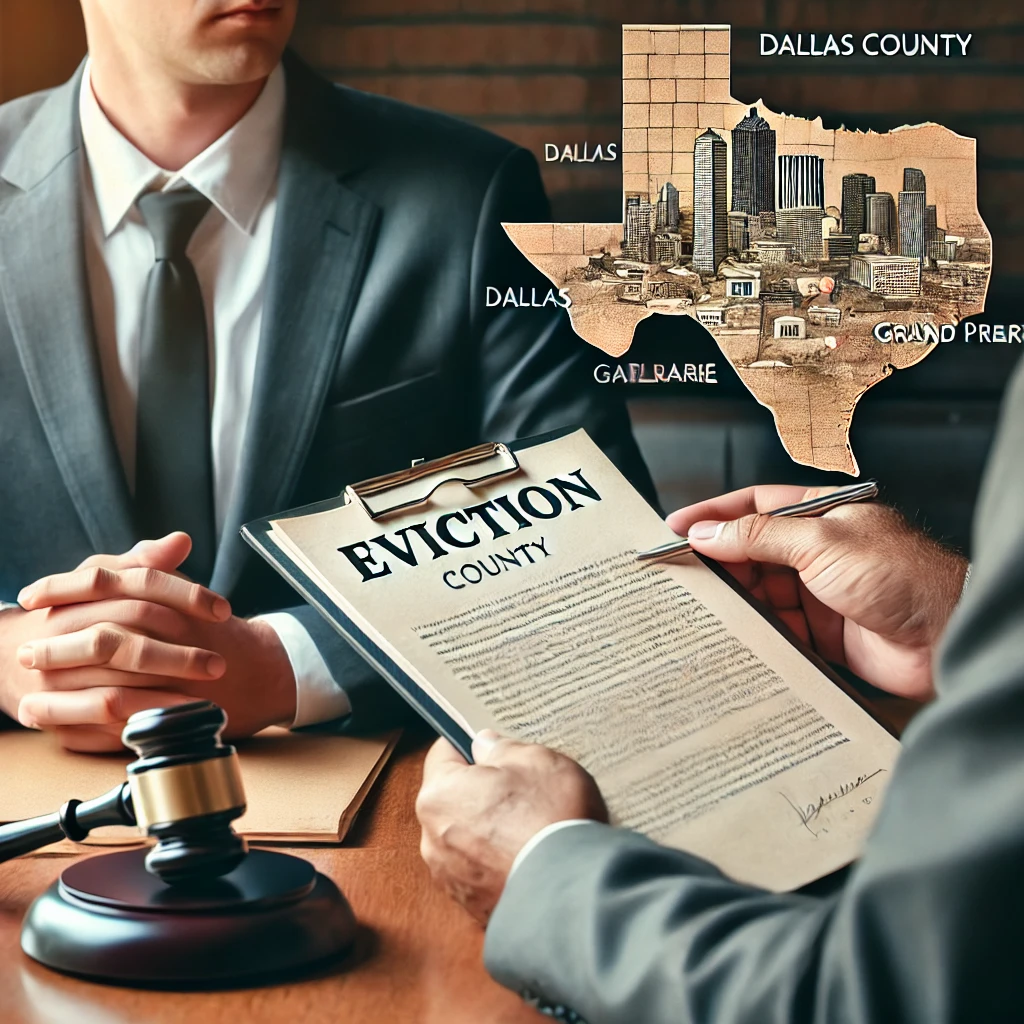Introduction
Evicting a tenant in Dallas County for non-payment of rent can be a complex and detailed process. As a landlord or rental property owner, it’s important to understand the legal steps involved to ensure the eviction is handled correctly. In this guide, we will walk you through the Dallas County eviction process, from filing to execution, including key details about the Justices of the Peace (JP) courts and the cities within Dallas County that they serve.
.

The Legal Steps in the Dallas County Eviction Process
When dealing with a non-paying tenant in Dallas County, the eviction process must be carefully followed to comply with Texas laws. Below are the essential steps you need to take:
Step 1 – Serve a Notice to Vacate
The first step in any eviction process is serving the tenant with a Termination notice. In Dallas County, this notice must give the tenant at least three days to either pay the overdue rent or vacate the property unless otherwise stated in the lease agreement. Be sure to serve this notice via certified mail or in person to create a paper trail.
Step 2 – File an Eviction Lawsuit
If the tenant does not comply with the notice, the next step is to file an eviction lawsuit (also known as a forcible detainer) with the appropriate Justice of the Peace court in Dallas County. This initiates the formal eviction process, and a court date will be set within 10 to 21 days of filing.
Step 3 – Attend the Eviction Hearing
You will need to attend a hearing at the Justice of the Peace (JP) court. During the hearing, you will present your case, including evidence of the tenant’s non-payment and any notices you served. The tenant will also have an opportunity to present their side.
Justices of the Peace in Dallas County
Dallas County has several Justice of the Peace (JP) courts, and your eviction case must be filed in the JP court that serves the precinct where your rental property is located. Below is a list of the key JP courts within Dallas County and their locations:
- JP 1-1: 8301 S Polk St #220, Dallas, TX 75232
- JP 2-1: 140 N Garland Ave, Garland, TX 75040
- JP 3-1: 1411 W Belt Line Rd, Richardson, TX 75080
- JP 4-1: 106 W Church St, Grand Prairie, TX 75050
- JP 5-1: 410 S Beckley Ave, Dallas, TX 75203
Make sure to check which precinct your property falls under before filing to avoid delays.
Cities Covered by Dallas County
Dallas County covers a large number of cities, and landlords in any of these cities will need to follow the same eviction process:
- Dallas
- Garland
- Irving
- Mesquite
- Grand Prairie
- Richardson
- Carrollton
- Balch Springs
- Farmers Branch
- Lancaster
- DeSoto
- Cedar Hill
These cities are all within the jurisdiction of the Dallas County courts, so landlords across these areas must adhere to county-wide eviction regulations.

After the Hearing – Writ of Possession
If the court rules in your favor and the tenant still refuses to vacate, you can request a Writ of Possession from the JP court. This allows a law enforcement officer to remove the tenant from the property legally. The tenant will typically have 24 to 48 hours to vacate after receiving the writ.
Common Mistakes to Avoid During the Eviction Process
- Improper Notice: Make sure the notice to vacate is correctly served with the appropriate timeline as per Texas law.
- Incomplete Documentation: Always bring all necessary documents to court, including the lease, payment records, and proof of the notice.
- Skipping the Hearing: As a landlord, you must attend the eviction hearing. Failing to appear could result in the dismissal of your case.
Conclusion – Get Help with Your Dallas County Eviction
Navigating the Dallas County eviction process can be overwhelming, especially if you are unfamiliar with Texas laws. Whether you own a property in Dallas, Garland, or any other city within the county, following the correct procedure is crucial for a successful eviction.
If you need assistance with the process, NTX Eviction is here to help. We offer professional eviction services in Dallas County, guiding you through each step—from filing the notice to representing you in court. Contact us today to learn more about how we can assist with your tenant issues.
Need more help? Have more questions? Contact us today for a free consultation
